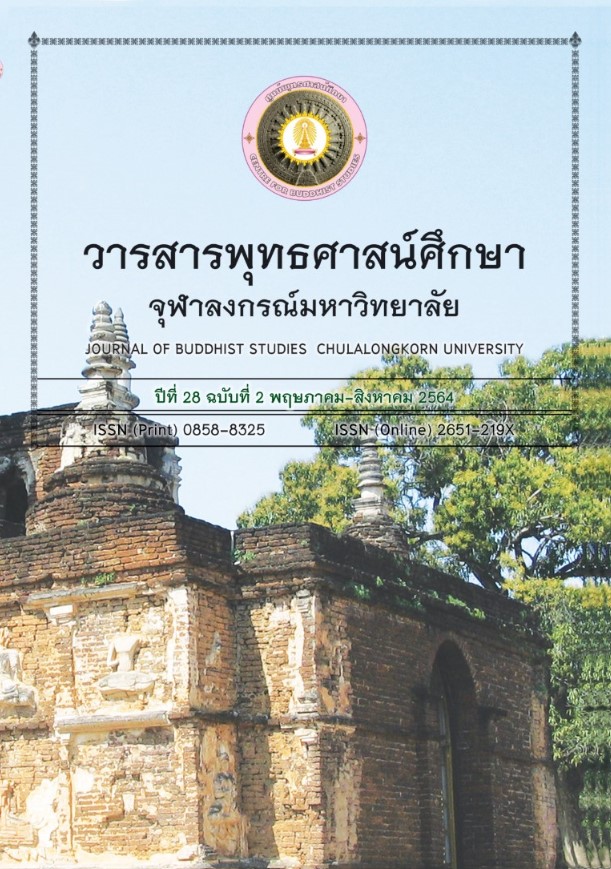Development of the concept of mind in Theravada Buddhism
Keywords:
Key word: development, Citta”mind” and TheravadaAbstract
This article is an academic article that aims to present the development of the concept of mind in the Theravada Buddhist scriptures by studying as follows 1. Set the concept (Concept), 2 Collect content, 3 Analyze / synthesize data groups (Classification). The result of the study found that in Theravada Buddhist scriptures stating of the concept of mind in the view of Brahmanism which was a pre-Buddhist belief that contradicts the Buddhist viewpoint of the state of commonality, showing the process of the mind according to the principle of reaction of Paticcasamuppāda (dependent origination, or dependent arising) by using different words to name the mind according to different functions, Such as (mind:Citta; heart/mind: Mno; spirit/consciousness: viññāṇa ). In the Suttantapitaka scriptures which some scholars’ believe that is the original concept that describes the mind of the Buddha. Later, the next generation of disciples proposed the concept of spirituality (ultimate realities) by classifying the mind into different types in the scriptures, they are the Abhidhamma Pitaka (The Abhidhamma Piṭaka is a collection of canonical texts in the Theravada Buddhist tradition) and the Abhidhamma Mattasangha, this can be considered as the development of the concept of mind in the Theravada Buddhist scriptures.
Downloads
References
ไชยทรง จันทร์อารีย์. ธรรมประทีป 9 ธรรมะภาคปฏิบัติ. สืบค้นจาก http://www.bloggang.com/mainblog.php?id=nulek&month=18052008&group=11&gblog=2 [21/02/2559].
บรรจบ บรรณรุจิ. (2537). จิต มโน วิญญาณ (พิมพครั้งที่ 4). กรุงเทพมหานคร : โรงพิมพ์ธรรมสภา.
พระธัมมานันทะมหาเถระ อัครมหาบัณฑิต. (2547). พระอภิธรรมเป็นพุทธพจน์และประวัติคัมภีร์สัททาวิเสส. กรุงเทพมหานคร: ห้างหุ้นส่วนจํากัดไทยรายวัน.
พระพรหมคุณาภรณ์ (ป.อ. ปยุตฺโต). (2554). พจนานุกรมพุทธศาสน์ ฉบับประมวลศัพท์ (พิมพครั้งที่ 17). กรุงเทพมหานคร: โรงพิมพ์พระพุทธศาสนาของธรรมสภา.
พระพรหมคุณาภรณ์ (ป.อ. ปยุตฺโต). (2555). ปฏิจจสมุปบาท (กรรมเกิด กรรมอาศัย กรรมเป็นไป ที่นี่)(พิมพ์ครั้งที่ 32). นครปฐม: วัดญาณเวศสกวัน.
พุทธทาสภิกขุ. (2517). อภิธรรมคืออะไร. กรุงเทพมหานคร: ธรรมสภา.
มหาจุฬาลงกรณราชวิทยาลัย. (2539). พระไตรปิฎกภาษาไทย ฉบับมหาจุฬาลงกรณราชวิทยาลัย. กรุงเทพมหานคร: โรงพิมพ์มหาจุฬาลงกรณราชวิทยาลัย.
มหาจุฬาลงกรณราชวิทยาลัย. (2559). อรรถกถาพระไตรปิฎกภาษาไทย ฉบับมหาจุฬาลงกรณราชวิทยาลัย. กรุงเทพมหานคร: โรงพิมพ์มหาจุฬาลงกรณราชวิทยาลัย.
วัชระ งามจิตรเจริญ. (2542). พัฒนาการของมโนทัศน์เรื่องอนัตตาในพุทธปรัชญา. วารสารพุทธศาสน์ศึกษาจุฬาลงกรณมหาวิทยาลัย. ปีที่ 6 ฉบับที่ 2 (พฤษภาคม-สิงหาคม 2542): 32-61.
สุจินต บริหารวนเขตต์. (2536). ปรมัตถ์ธรรมสังเขป จิตตสังเขป และภาคผนวก. กรุงเทพมหานคร: หจก. โรงพิมพ์ชวนพิมพ์.
Downloads
Published
How to Cite
Issue
Section
License
บทความที่ได้รับการตีพิมพ์เป็นลิขสิทธิ์ของศูนย์พุทธศาสน์ จุฬาลงกรณ์มหาวิทยาลัย
ข้อความที่ปรากฏในบทความแต่ละเรื่องในวารสารวิชาการเล่มนี้เป็นความคิดเห็นส่วนตัวของผู้เขียนแต่ละท่านไม่เกี่ยวข้องกับศูนย์พุทธศาสน์ จุฬาลงกรณ์มหาวิทยาลัย และคณาจารย์ท่านอื่นๆในมหาวิทยาลัยฯ แต่อย่างใด ความรับผิดชอบองค์ประกอบทั้งหมดของบทความแต่ละเรื่องเป็นของผู้เขียนแต่ละท่าน หากมีความผิดพลาดใดๆ ผู้เขียนแต่ละท่านจะรับผิดชอบบทความของตนเองแต่ผู้เดียว






